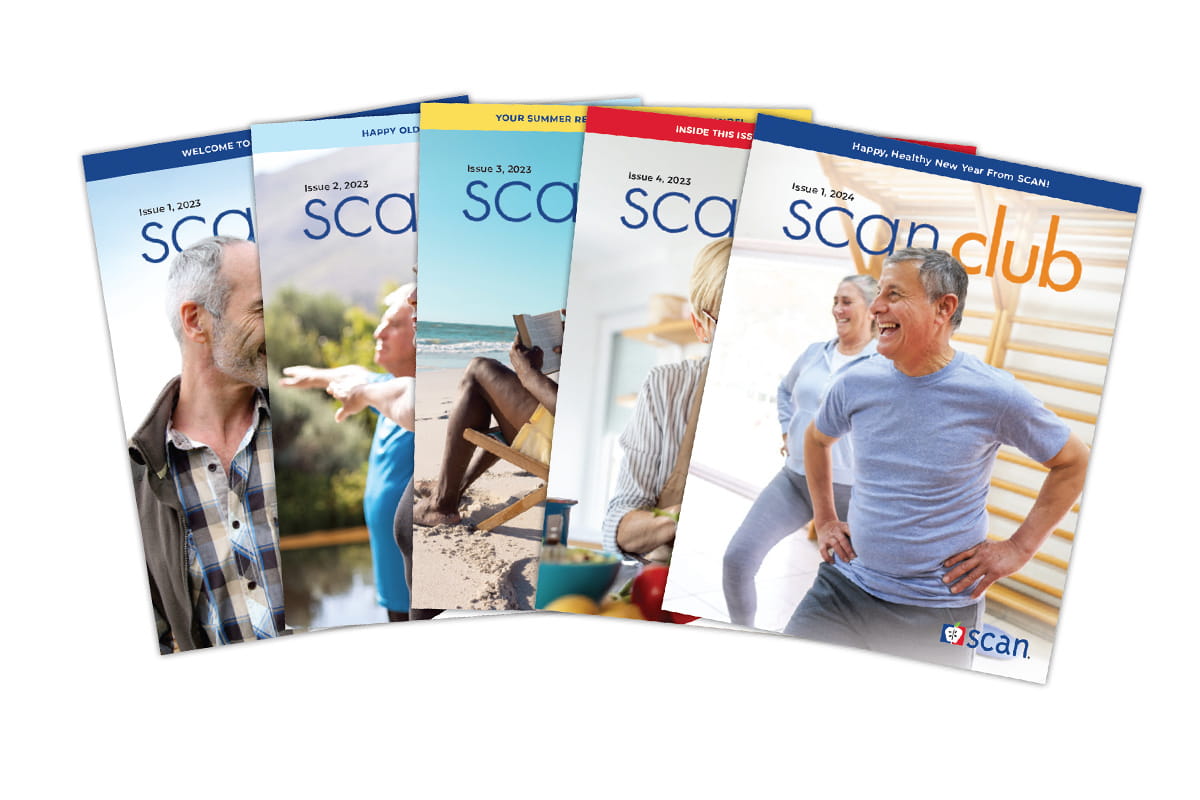Two SCAN Members Know: Even Active Seniors Can Fall

It was a lazy Sunday morning at home and SCAN member Connie H. wasn’t working out at the gym, hiking or doing the other activities that kept the 69-year-old senior fit and active. She was sitting at her kitchen table, wearing a pair of floppy slippers and enjoying a peaceful start to her day—until it wasn’t.
Standing up quickly to leave the table, Connie caught the heel of one of her slippers on the table leg. She remembers being flung “like a rubber band” across the room into the corner of a wall and landing on the floor, stunned, in pain and unable to move her left arm.
“It all happened so fast; I couldn’t catch myself,” she says, recalling how she couldn’t avoid falling.
Eventually, Connie was able to drag herself to her phone in another room and she dialed 9-1-1. An ambulance ride to the ER followed—and then a long, painful recovery after the fall for a broken arm that upended her life for many months.
A fall can seriously interrupt an active senior’s life. “I struggled to do the simplest things: get dressed, shower, make meals, clean my house, do my hair, drive. It was too painful to sleep,” Connie says. “For six weeks, my life revolved around that broken arm. And for months after that, I was doing physical therapy at home twice a day and couldn’t go anywhere because it hurt even when walking.
“I had no idea how much time, inconvenience and pain comes from a fall,” Connie says. “And it was all because I was rushing and wearing the wrong shoes.”
Another Unexpected Fall
SCAN member Maxine M. experienced two falls in as many years. The first was a planned and safely executed tandem skydive from 12,000 feet to mark her 75th birthday last year. The second fall happened unexpectedly, while doing something that sounds far less dangerous but injured the active and fit senior.
As Maxine tells it, “I had been playing Scrabble at the table for three hours straight. I got up to go to the restroom and found my right foot had gone to sleep. When I put my weight on it, I collapsed to the floor, landing on my backside.” She got up with help, played another game and drove herself home. But two days later, the pain persisted, and her toes were turning black and blue. Maxine used her SCAN Medicare Advantage plan benefits to go to the urgent care center, where a doctor confirmed she’d broken a bone in her foot.
“It was painful,” Maxine says, “and I had to wear a bulky fracture boot for six weeks.” Since the fall broke her driving foot, Maxine had to rely on her husband to take her places while she recovered.
More Mindful of Fall Risks
Happily, Connie and Maxine have each recovered from their falls and are back to their active, on-the-go lives. But they say the memories of their falls and the painful recovery time make them more mindful these days of taking steps to prevent another fall in the future.
Maxine, who works part-time as a SCAN Senior Advocate, says she still bicycles and does her daily stretches. But she admits to feeling more vulnerable than before she fell. She hasn’t given up on Scrabble, but she says, “I’m always careful when I get up from a long sit” to avoid falling again.
Before her fall, Connie never used to think twice about occasionally hopping on a bike or taking her boogie board out for a ride, but now such activities give the active SCAN member pause. She says she still will do them now and then, but only when she has seriously considered the risks of falling and injuring herself again.
5 Tips for Preventing a Fall
SCAN members Connie and Maxine remind us that an unexpected fall can happen to anyone, even if you’re fit, healthy and active. Reduce your fall risk with these tips:
Fall-Prevention Tip #1: Slow down. Connie spoke with thousands of SCAN members when she was a SCAN Senior Advocate. She says many of them told her they had fallen because they were rushing.
Fall-Prevention Tip #2: Be aware of changes in your surroundings that could be potential hazards. Connie is reminded of a conversation with a SCAN member who was accustomed to walking around home in his socks. He fell and broke a hip after the housekeeper changed to a cleaning formula that made the kitchen floor more slippery.
Fall-Prevention Tip #3: Hold on to stairway rails. “I never used to hold on to stair railings,” Connie says, “but now I always do.” Here’s another tip to avoid falling on stairs: Count steps so you know when you’re close to a landing. Otherwise, you might misstep, stumble and fall.
Fall-Prevention Tip #4: Get rid of clothes and shoes that might make you trip. After her fall, Connie hemmed maxi dresses that caught on her foot and rid her closet of unsafe shoes—including the notorious floppy slippers.
Fall-Prevention Tip #5: Tell your doctor that you fell, even if you weren’t injured from the fall. When your doctor knows you’ve fallen, they can help you address any issues with balance, leg strength or medications that could lead to another fall in the future.
If you have don’t have a Medicare Advantage plan, take a look at the benefits, comprehensive coverage, award-winning service, and more, offered by SCAN Health Plan.




